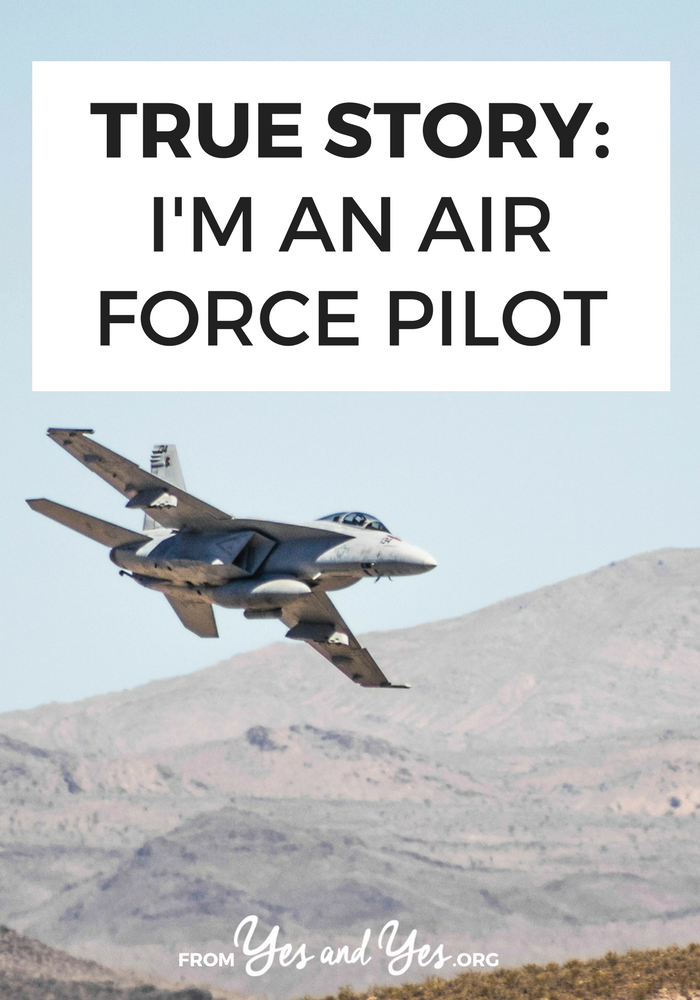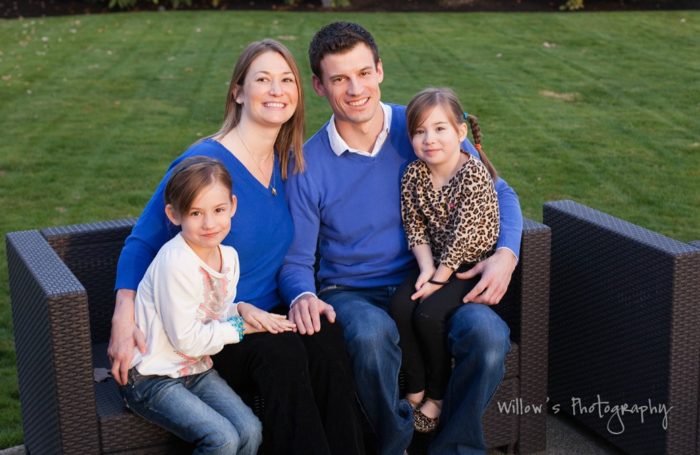
For as long as I remember I have been enamored with aviation. As a child I wanted to be at the controls of all the jets I could see passing overhead, effortlessly moving among the clouds.
I went through Air Force Officer Training during college, which was 4 years of training a few days a week—leadership labs, physical training, and normal classes.My junior year I competed for a limited number of pilot “slots” and received word that I would attend pilot training after graduation. It was a bit of an ordeal.
The cadre of the unit decided to mess with us: there were 6 cadets that had applied for pilot slots, and they gave out 3 notifications (by handing a folded flight suit to the grinning recipient), then suddenly quit announcing “no more this year.”
The mood in the room quickly plummeted, and then the cadre gradually revealed that there were one or two, or three, or four to go! They ended up giving out 7 slots (you’re right, one extra, to a guy who had applied the year previous.) I was number 6 of 7, and should have received 3 credits on human anxiety for the experience.
After graduating I shipped to Texas and began flying at a base literally within view of the Mexico border. Flight training lasts just over a year, and involves flights, tests, simulator events, surprise tests, physical challenges, more tests and dreaded checkrides, where someone does nothing but sit like a stump watching your every move while you fly an entire profile on your own.
Checkrides were the least fun event in pilot training, or as student pilots term it “the most fun we never want to have again.”
That being said, there were some amazing experiences there. The film set for the movie “Lonesome Dove” was nearby and we would use it as an aerial reference point. The Rio Grande River was also a visual reference, because you needed to keep it on your left at all times.
If you looked down and saw it on your right it meant you just had failed your flight event: by flying into Mexico! This of course was especially bad on checkrides, unless of course your check pilot had been lulled into sleep by your graceful flying and didn’t hear the angry Mexican controllers on the radio.
After Undergraduate Pilot Training you compete for which plane you will fly operationally. I was fortunate to get the C-17, which is a 4-engine heavy transport, and one of my top choices. I flew it for 3 years beginning in 2003, and then transferred to an unmanned aerial vehicle called the Global Hawk.
This is a plane with no human onboard, roughly the same dimensions as a Boeing 737 airliner, that flies at altitudes above 60,000 feet. The plane is similar in nature to the U-2, and carries a number of camera sensors to gather imagery and intel of the battlefield. I flew the Global Hawk for 4 years, and will return to the C-17 in September 2010.
What has been your most nerve-racking flight?
Hmmm. Well, everybody thinks it would be being shot at, but that actually isn’t too nerve-racking since you don’t have time to worry.
I once had to get gas from a refueling tanker at night in turbulence with our Wing Commander (imagine your biggest boss at work) in the seat behind me, knowing that if we didn’t get enough fuel we were diverting into Canada and he would be late for his arrival by several hours. No pressure!
Some of the more tense flights are carrying wounded out of the combat zone. We try to make the flights as comfortable and efficient as possible of course, and the more serious trauma and burn victims will have dedicated attendees during the course of the flight.
Those are always tense because there are few divert options in the event the patient’s condition worsens. Not being able to help while someone slowly succumbs is among the worst memories of my career.
The other tense times are trying to get into a strange field, like a dirt field in northern Afghanistan, or into an extremely busy airport, like Frankfurt International in Germany.
Every 30 seconds they have a plane departing or landing, and there is zero room for error when they give you instructions. Combine that with the German air controllers’ strange sense of humor and you get instructions to state remaining fuel onboard, so they know how long they can force you to hold in the penalty box.
I’ve heard other planes get sent to the penalty box (what we simply call having to hold position by doing endless circles) because they didn’t respond to their call sign, or for falsely responding when the controller was calling someone else. It makes for great stories!
What’s the most bizarre cargo you’ve carried?
Pallets of money. Pallets of Doritos (this is not a joke). Tanks. Marine One (President’s helicopter). Voting stations/supplies for Iraqi elections, and the people who would man the stations.
Mostly though it’s equipment—vehicles, ammo, or as the army calls it “bullets and beans.”
Have you had any close calls?
No comment for fear my mother will read this. Also, any pilot worth his/her salt will always retort with “No, of course not. I am perfect.” Pilots are notoriously egotistic!
I will tell you that landing a 250-ton blacked out jet at an airport recently “secured” by the Marines at night with night vision goggles can be sporty. It can be a lot of pressure managing a crew of 5, with the average age being 22.
That being said, they are all professionals, and so when you are on glide slope passing through 300 feet, with the long profile of the runway visible through the soft green glow of the Heads-Up-Display (HUD), you hear in the background the copilot call the landing zone and are comforted knowing you are part of an efficient team. I think that is one of the most satisfying aspects of the job: working with top notch people.
Tell us about an average day-in-the-life of an air force pilot.
There really is no daily grind, each mission takes on a life of itself. Sometimes you get chopped to the Army and do 6 hops in one afternoon, hauling jeeps or pallets or troops into or out of some forward operating location.
Sometimes you are assigned to support VIPs or embassies, and participate in a world-wide tour. Sometimes you fly empty across the North Atlantic and amuse yourself by watching the Northern Lights slowly twirl over Greenland.
Any advice for readers who are interested in flying for a living?
Do it!! There are many paths into aviation, and serving in the military is only one way of making it happen. Many airports have aero clubs that offer reduced prices for someone thinking about taking flight lessons, which is a great way to try it out before having to commit to a packet of lessons.
Do any of you fly? Any questions for Andy?












Wow! I'm too scared to do that. I admire anyone who can do that.
Andy – I don't know if you'll be able to answer this as I live in Canada, but I'll ask anyway! My brother has always loved the idea of becoming a pilot, however he is nearly 28 years old and hasn't done anything toward attaining that goal. He suffered severe clinical depression as a teenager that caused him to not complete high school until age 25 and he has not done any post-secondary schooling. He is doing really well now and is much more motivated.
Our uncle who had a military career in England has expressed concern that my brother's past will make it impossible for him to become a pilot because he started too late – that he will never get into the program because that will look like a giant red flag. From your experience with a military pilot career, is this probably true?
Laura-
Excellent question–I think that as long as the symptoms and conditions of his depression have subsided he may still have a shot. However, he is on a short timeline. The AF will typically not take pilot candidates after age 32, which would mean he has 4 years to get a college degree and apply to a commissioning program (OTS or ROTC would be the easiest, in my opinion, but he could also apply to the AF Academy). Certainly not unattainable, but like all great goals would require focus and commitment.
Again–I am a pilot, not a screener, so if you or he have specific questions I would recommend contacting a recruiter (don't worry, everybody has to do it!)
I went to AHS also and this was a really cool interview. Andy – Thanks for your sacrifice for our country.
Nick
Hello,
Since my birth it is my wish and aim of life to be fighter aircraft pilot, and I still have love and madness to fly in air.
I want to have friendship with you please reply me must, I want to discuss more things with you about fighter pilot and aircrafts…. When you email me write in subject “Fighter Aircraft Pilot”.
Please reply me at: youandme_friendship@yahoo.com
Hello Andy.
I am a senior in high school and have wanted to be a pilot since the age of six. I currently hold my private pilot license and plan on going on all the way through flight intructor. I have always had Air Force in mind, and with all the costs and such of training and obtaining those flight hours, the time to make some serious decisions have come.
I would love to talk more about why you choose your flight path and your experience as a pilot. Please reply with an email to GreenGen2262@yahoo.com. I look forward to hearing from you.